Matlock care farming group gives people with dementia chance to shine
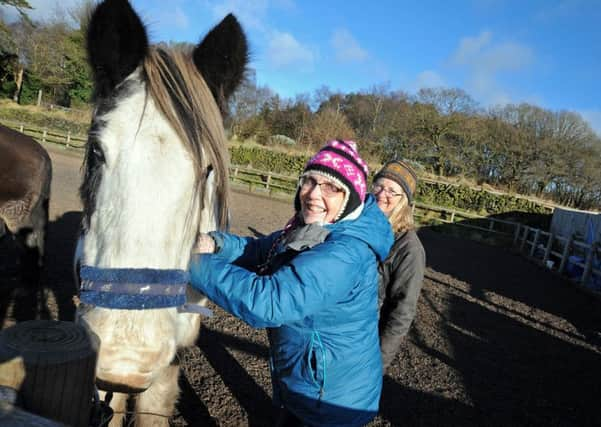

Occupational therapist Mary Derrick and psychotherapist Robyn Hughes have been running the Care Farming Project throughout the autumn with a group of people aged 59 to 87, all of whom live with dementia or mental health needs, their carers and specially-trained volunteers.
Mary said: “It’s about engaging people in something active and stimulating, and connecting both with the environment and with people facing similar difficulties. We want people to live, not just exist.”
Advertisement
Hide AdAdvertisement
Hide AdCare farming is more commonly seen as a therapeutic technique for use with younger people, or as a way to improve dynamics in challenging groups, but there is a growing clinical consensus that it has lifelong merits.
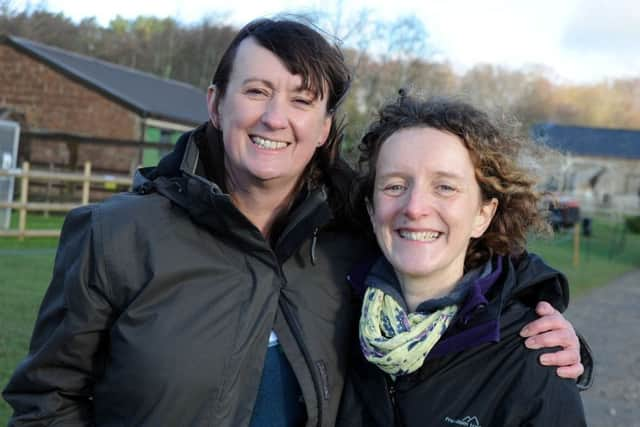

Mary said: “There’s a growing awareness across so many sectors of society, that a connection with nature is vital to physical and mental wellbeing.
“Studies suggest people require less pain management in hospital if they can see green space outside, just as they learn better in schools and live more happily on housing estates.
“I’ve been frustrated at times in my career that people have to fit into the boxes of whatever services are on offer. For older people, that’s typically day care community services, but not everybody wants that.
Advertisement
Hide AdAdvertisement
Hide Ad“The big thing that makes this different is that we’re careful but not risk averse, we take positive risks. Even those people in their 80s, given their histories, hobbies and how they’ve led their lives, they don’t want to stop going outside and experiencing things – even in the colder months.”
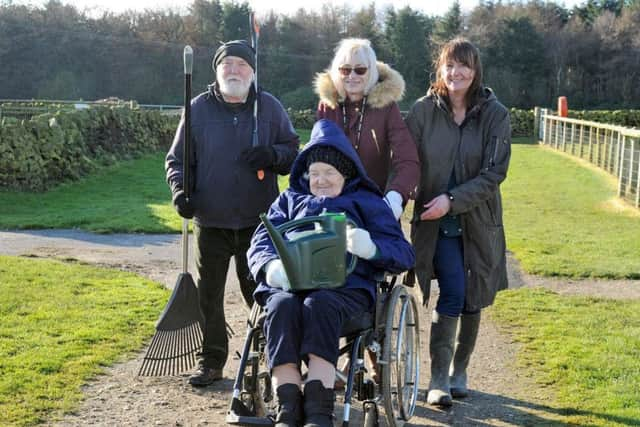

She added: “The people who have been attracted to this project are those who don’t necessarily want to be cared for in a traditional setting all the time. Whatever their level of cognitive ability, they’ve still got so much to give. They want to be independent, purposeful and making a valued contribution.
“We have one lady who says she has been a bit of a tom-boy all her life – she got given a cement mixer for her 60th birthday.
“She rolls up her sleeves and gets stuck into any hands-on task she is presented with. She doesn’t get those opportunities in her everyday life, but here she is animated, and proud of what she’s done.”
Advertisement
Hide AdAdvertisement
Hide AdThe weekly sessions at Matlock Farm Park see the group spend a morning as working volunteers, then enjoy a sociable lunch where the group bond over common interests, followed by indoor sensory eco-craft activities in the afternoon.
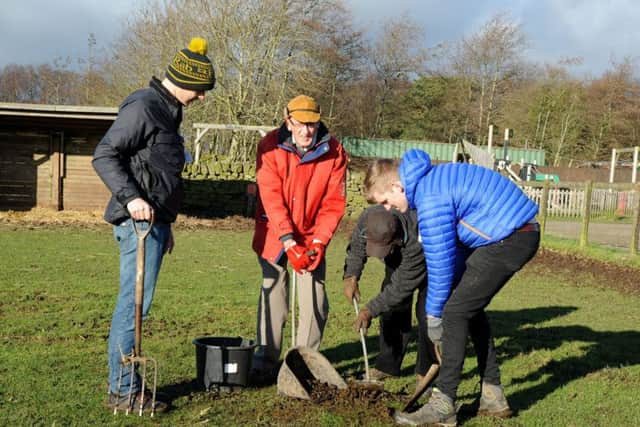

Mary said: “A lot of it is based around animal welfare. We’ll groom horses, clean out the stables and the wallaby enclosure and the rheas, and go around raking, shovelling, putting fresh hay and water out. Animals don’t come with as many expectations as humans do, which often makes it easier for people to connect with them.
“The participants appreciated their role as volunteers on the farm, having meaningful work to do and just being up there in the fresh air and the wilderness.
“Matlock Farm Park have been brilliant in providing us with the facilities. They don’t always have time to do everything anyway, and it’s helping their staff learn to run their business as a dementia-friendly facility too.”
Advertisement
Hide AdAdvertisement
Hide AdShe added: “Some of the participants are fairly advanced in their dementia. But when they’re presented with stimulating activity we’ve seen some lovely and unexpected verbal communication. It’s been heart-warming to see and hear, and for their loved ones to witness it too when it may normally hard to hear that meaningful speech.
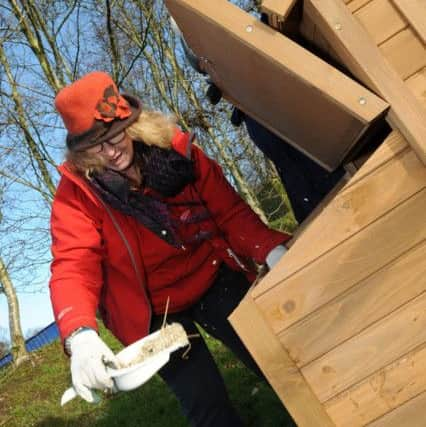

“We see people have a joke with each other, there’s a lot of humour, often in very subtle ways. There are some very charming people, and real, proper gentlemen in the group, and it’s lovely to see that essence come through so strongly, and for them to show who they are regardless of any impairment.
“With the crafts, people can get as creative as they want, or just experience the unusual objects we might choose as a basis for the activity, whether that’s nuts and bolts for making windchimes, pumpkin vases for autumn arrangements, or orange and cinnamon Christmas wreaths.”
Family and professional carers have been invited to the sessions. Some have welcomed the opportunity to take some time to themselves, while their loved ones are in a place they are happy, safe and occupied.
Advertisement
Hide AdAdvertisement
Hide AdOthers have enjoyed the chance to talk in informal group or one-to-one therapy sessions facilitated by Robyn, as well as getting involved in the activities and seeing what difference they make.
Mary said: “It’s important for them to share their story, and their experiences with people who understand. There are many feelings of loss involved in the role of a carer, so they are benefitting from that contact.”
Mary, 45, divides her working life between the NHS and private practice, and has come to recognise the role that community plays in helping to support a person, and how a community can grow by learning to embrace people who are living with dementia.
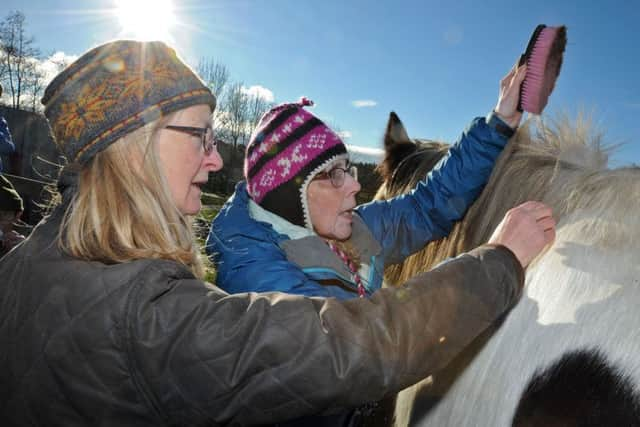

She said: “This is the first project run by the Connection Space, which is a Community Interest Company we’ve set up to promote emotional and mental health and wellbeing with people of all ages throughout the Derbyshire Dales. The Alzheimer’s Society have been doing a lot of work to help local towns adapt, and we’re looking to add to that.
Advertisement
Hide AdAdvertisement
Hide Ad“We’re seeing really positive relationships develop between the project participants, carers, and with our volunteers. We hope there is some longevity there, which can help build up community resilience.”
Mary added: “Not all of our projects will be like this, but we hope we can find further funding to continue offering care farming now we have demonstrated its potential here.”
The project balances the social benefits with individual transformation, rooted in a therapeutic approach to each participant.
Mary said: “In the group, we’ve got people of different abilities and limitations, but can adapt everything we do to suit each individual and so that their different skills will complement each other.
Advertisement
Hide AdAdvertisement
Hide Ad“Whether they have dementia or other mental health needs, it’s about person-centred care and teasing out what is important to them, and how we can help them be as independent as possible.”
The non-profit Community Interest Company was set up by Mary and Robyn, along with Carla Eyre, who died earlier this year. Her husband Brian has since taken over the third director’s post, and is volunteering with the farm project.
Mary said: “The volunteers have all undergone training, and have been an incredibly important part of the whole process. They are a lovely group and have added so much value, and gained a lot from it themselves.”
The company was supported initially by the Derbyshire Dales District Council business service, Growing Rural Enterprise, which provided basic business training, a mentor and vital contacts.
Advertisement
Hide AdAdvertisement
Hide AdThe project was advertised through local health centres, community noticeboards, and care services, and as the professionals involved realised its potential benefits, they also realised the demand that exists already.
Mary said: “It had a ripple effect, but slowly more and more people found us. We’re still getting a lot of phone calls to ask if there are spaces, and GPs who say they have suitable patients in mind for it.
“We’ve kept the group small to ensure it’s a quality service, and because we’ve all been on a learning curve, but there is definitely scope to grow the project. We can see there is a need for it.”
So far, sessions have been run on a £10,000 Awards for All grant, funded by the National Lottery, but that will cover just the first 11-week pilot ending early in the new year.
Advertisement
Hide AdAdvertisement
Hide AdMary and Robyn are now approaching more organisations in the hope of securing more long-term support.
The company also has an all-ages mental health group starting up for men to combat social isolation and anxiety, and another in the pipeline exploring the creative use of dance with people who have dementia.
To find out more, follow them on Facebook @TheConnectionSpaceCommunityIntetestCompany, or call Mary on 0745 0195051.